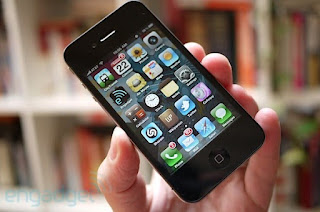Finland has become the first country in the world to make broadband a legal right for every citizen.
From 1 July every Finn will have the right to access to a 1Mbps (megabit per second) broadband connection.
Wednesday, June 30, 2010
Monday, June 28, 2010
Amazon Releases Kindle App for Android Phones
No Kindle? No problem.
Amazon is quickly expanding the reach of its electronic books business by offering its Kindle application on PCs and mobile phones.
Saturday, June 26, 2010
The Best 5 iPad Apps for Business
Apple's just-launched iPad might be the must-have gadget of the season -- or perhaps the entire year -- but it's more than just a tech toy. Hundreds of dedicated applications ("apps") are already available to help small and mid-sized businesses remain productive on the go.
Friday, June 25, 2010
iPhone 4 - Your Burning Questions Answered
Wednesday, June 23, 2010
Judge Sides With Google in Viacom Suit Over Videos
In a major victory for Google in its battle with media companies, a federal judge in New York on Wednesday threw out Viacom’s $1 billion copyright infringement lawsuit against Google’s YouTube, the No. 1 Internet video-sharing site.
Tuesday, June 22, 2010
Google Voice Finally Open to U.S. Residents
 Google Voice, the service that’s been behind a velvet rope for almost a year, is finally opening up to all comers, at least in the U.S. Google Voice is based on Grand Central’s one-number-for-life service. Google acquired Grand Central
Google Voice, the service that’s been behind a velvet rope for almost a year, is finally opening up to all comers, at least in the U.S. Google Voice is based on Grand Central’s one-number-for-life service. Google acquired Grand CentralMonday, June 21, 2010
French find e-mail passwords in Google Street View data
Google scooped up sensitive data such as passwords when putting together its Street View service, suggests an early look at the information.
Saturday, June 19, 2010
10 things to know about iPhone 4
Apple CEO Steve Jobs says the iPhone 4, which debuted on Monday, is the "biggest leap forward" the iPhone has made since it was introduced in 2007.
Friday, June 18, 2010
Fighting back against web attacks
Tuesday, June 15, 2010
Technology milestone heralds a more secure internet
Moves to make the web's address system more secure will take a major step forward next month.
In the planning for a decade, the Domain Name System Security Extentions, DNSSEC, will help protect users from cyber attacks such as phishing and spam.
(The system could close the loophole that redirects web users to fake sites)
The security layer will be added to the web's address system in July.
It should close the loophole that allows hackers to intercept DNS data and redirect users to fake websites.
The Domain Name System (DNS) was created in 1984 to allow computers to 'read' net domain names but it had no security features, offering rich possibilities for criminals.
"DNSSEC will improve the security of the web so we can have more confidence in the activities on the network as it increasingly becomes part of our working lives and home lives," said Leslie Daigle the chief internet technology officer at the Internet Society, which is the home of the standards body that developed DNSSEC.
The new security extension, DNSSEC, basically works by using cryptography and digital signatures to verify each query and ensure that each response that is made has not been compromised or intercepted.
Cyber-criminals are increasingly using false DNS servers to intercept legitimate web addresses and redirect users to fake sites, which steal personal information.
"It acts like tamper-proof packaging to make sure if you type in the website name of your bank that you actually get to the machine that your bank wants you to use and not to a machine that looks like that of your bank but is operated by those who want to take you to a different website to steal your log-in details," said Ms Daigle.
'Security puzzle'
The reason this move is being seen as a "technological milestone" in shoring up the web is because, although not visible to most users, DNS is an essential part of the way the internet works.
It acts as the net's address system or phone book by translating website addresses like www.bbc.co.uk into the numerical equivalents preferred by machines.
The DNSSEC protocol is being overseen by the Internet Corporation for Assigned Names and Numbers (Icann), which is the administrative body behind net addresses.
It is working with domain-name registrars and root nameservers - which are at the heart of translating web addresses into IP addresses - to make sure the process runs smoothly.
However Ms Daigle told the BBC, DNSSEC cannot solve all the evils perpetrated by cyber-criminals and best practices that people have been using should not be abandoned.
"It is a piece of the security puzzle and while it does build better security around everything people are doing on the internet, users should not become lax in how they protect themselves online," she said.
Revolutionary
One of the greatest critics of the security of the Domain Name System has been Dan Kaminsky, chief scientist at security firm Recursion Ventures.
In 2008 he went public with a flaw that he found in the DNS which meant the internet was at the mercy of phishing gangs who could redirect internet users to fake banks sites to steal their personal information.
This issue became known as the "Kaminsky bug" and is often referred to as cache poisoning.
Mr Kaminsky told the BBC that even though he was initially sceptical of the efficacy of DNSSEC, he has examined the code carefully and has become a recent convert having declared it "awesome" in its ability to provide a "safer and more secure internet".
"The basic flaw of the internet is one of trust and this will revolutionise the way we use the internet.
"In my mind the biggest benefit we will get concerns one of the biggest embarrassments in the security sector and that is secure email where it will be truly possible to know that when you get an email from your bank, it really is your bank," said Mr Kaminsky.
The Internet Engineering Task Force's Ms Daigle agreed and called DNSSEC "an essential building block for building a larger internet future" that will allow us to take on "bigger activities and carry out new applications".
BBC
Nintendo unveils 3D game gadget
Nintendo has unveiled its new 3D handheld gaming system at a briefing in Los Angeles at the E3 games show.
Called 3DS, the system can display 3D images that can be seen without using special glasses.
Called 3DS, the system can display 3D images that can be seen without using special glasses.
Monday, June 14, 2010
Microsoft's Kinect makes a splash
 |
| (Project Natal, essentially Microsoft's answer to Nintendo's Wii, has a new name: Kinect) |
Cirque du Soleil helps launch controller-less system
Project Natal, essentially Microsoft's answer to Nintendo's Wii, has a new name: Kinect.
Microsoft made a big splash with the controller-less system last summer when it introduced Project Natal at the Electronic Entertainment Expo in Los Angeles.
Saturday, June 12, 2010
Adobe fixes 'critical' Flash flaw
Adobe has fixed a "critical" security flaw that had the potential to allow hackers to take control of affected computer systems.
The bug was first spotted in early June week following a small number of targeted attacks.
(Adobe's Flash software has become a favourite among hi-tech criminals)
The security update is one in a bumper update package that fixes a total of 32 documented vulnerabilities.
Adobe's Flash and Reader software have emerged as prime targets for hi-tech criminals in the past year.
Users running Windows, Macintosh or Linux were all thought to be vulnerable to attack.
Security firm Websense said the flaw was being exploited via e-mails that prompted recipients to open booby-trapped websites seeded with malware.
Users visiting the websites would have their computers infected with trojans and other malicious programs that opened a backdoor into the machine.
Adobe urged users to apply the update as soon as possible.
Adobe said it would release an update at the end of June for its Reader and Acrobat programs which addresses a similar bug that makes it possible to booby-trap PDFs.
Adobe is reportedly considering patching its applications more frequently after a quarterly update cycle for its Acrobat and Reader programmes last year.
In 2009, Adobe announced an aggressive programme to beef up security after hackers increasingly focused on finding holes in its products.
'Huge release'
The security update came in the release of version 10.1 of the Flash player.
"Don't let the version number fool you! Flash Player 10.1 is more than a 'dot upgrade'," said Paul Betlem of Adobe's Flash Player engineering team.
Mr Betlem said the update was a "monumental undertaking" that made significant changes to the architecture of the software.
Adobe estimates that more than 95% of computers worldwide have Flash Player installed. Many sites use it to show off multimedia content such as videos and games.
Wired called the latest release "significant" and said the underlying code has been largely re-written to address the platform's key shortcomings, most notably battery problems and security issues.
"This is obviously a huge release for Adobe, as it comes at a time when the company is under attack for its platform's pitfalls," said Michael Calore at Wired.
Chief among Flash's critics is Apple boss Steve Jobs who wrote an open letter explaining why he refused to have Flash on products such as the iPhone and iPad.
He claimed that it was "the number one reason why Macs crash."
BBC
Japanese Spacecraft Set to Return to Earth
Scientists will be eagerly scanning the night sky over the Australian Outback this weekend for the long-delayed return of the first spacecraft to complete a round-trip journey to an asteroid.
Thursday, June 10, 2010
Google accused of criminal intent
Google accused of criminal intent over StreetView data
Google is "almost certain" to face prosecution for collecting data from unsecured wi-fi networks, according to Privacy International (PI).
Google is "almost certain" to face prosecution for collecting data from unsecured wi-fi networks, according to Privacy International (PI).
Wednesday, June 09, 2010
Monday, June 07, 2010
Apple shows off redesigned iPhone
Apple has unveiled a redesign of its popular iPhone handset.
The revamped gadget has a stainless steel case, two cameras, improved display and is 24% thinner than the most recent
version.
The revamped gadget has a stainless steel case, two cameras, improved display and is 24% thinner than the most recent
version.
Crystal Gazing
Also called crystal gazing, scrying is the magical practice of divining the past, present, or future by gazing into a usually reflective, translucent, or luminescent medium, such as crystal, mirror, water, or fire. The Cup of Jamshid, described in Persian mythology as a magical cup containing an
Thursday, June 03, 2010
Subscribe to:
Posts (Atom)























